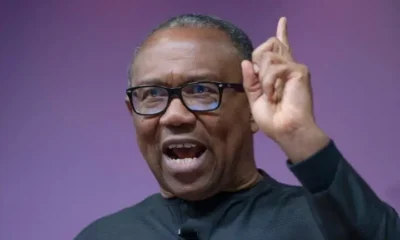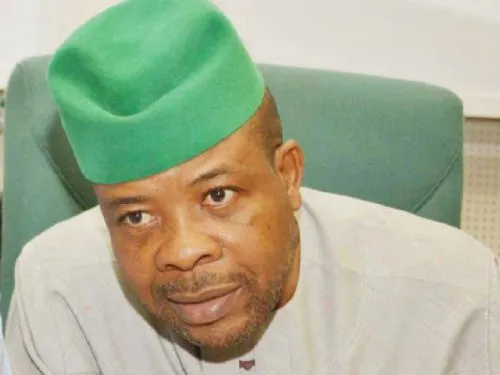Nigeria may take a breather from the twin issues of crisis in the production and distribution of petroleum products and rising cost of dollars, if the words of Aliko Dangote, Africa’s richest man, who promised to tackle them, become real.
Dangote, owner of the Dangote Refinery, Nigeria’s first private initiative in processing crude on a large scale and Africa’s largest in terms of capacity, was quoted as saying that with the planned commencement of the refinery located in Lagos, Nigeria could save up to $10 billion in foreign exchange (FX) and generate another $10 billion in exports when the facility begins operation.
The 650,000 barrels per day, also reputed to be the world’s largest single-train refinery, is set for inauguration on May 22, by President Muhammadu Buhari.
The business magnate, who spoke in an interview with a special edition of London-based The Economists Magazine, entitled: The World Ahead 2023’which was unveiled with considerable focus on West Africa and aimed to highlight both the potential as well as areas for improvement in Africa, was quoted as saying Nigeria currently imports over 90 per cent of its refined petroleum products, which amounted to roughly $10 billion in imports in 2022.
While this has brought major benefits to many businesses, Dangote explained that more prosperity could be created by locally refining Nigeria’s resources, with the refinery being a major step in this direction by reducing the country’s dependence on imported refined petroleum products.
“The refinery’s completion will not only create direct and indirect jobs, but also lead to skills transfer and technology acquisition opportunities that will benefit the downstream sector.
“Moreover, the refinery’s production of critical products like naphtha and polypropylene will stimulate the development of other industries, such as cosmetics, plastics, and textiles. Refineries on this scale could save Nigeria up to $10 billion in foreign exchange and generate approximately $10 billion from exports.
“We see room for development of added value in agribusiness too. Here, initiatives like our Sugar Backward Integration Projects look to create a strong localised supply in the sugar industry. With a goal to produce around 0.5 million tons of sugar per annum from locally grown sugar cane, benefits will be created across the sugar value chain for local suppliers,” he added.
He noted that the soon-to-be commissioned 650,000 barrels per day refinery in Lagos, would enable Nigeria achieve self-sufficiency in refined petroleum products, as well as export to other African markets.
According to him, there are also ample opportunities to increase the country’s rice production, with the ongoing construction of six rice mills that could mill approximately one million tons per annum of locally produced rice, thereby empowering local farmers.
The renowned businessman pointed out that the group of companies also has a 2.8 million tons per annum fertiliser plant tapping into the fertiliser market, while opportunities are being explored in tomato cultivation and processing as well as dairy production.
“With many parts of West Africa still facing food insecurity, the emergence of strong localised industries with resourceful suppliers and clear trade networks will be a big step in the right direction,” he maintained.
Dangote stressed that Nigeria presents an attractive investment opportunity for international investors, saying with the country’s abundance of natural resources, diversifying and digitising economy, youthful demographics and vibrant society, investors will find in Nigeria a country of many possibilities.
“Its population of over 200 million — of which 40 per cent is under the age of 15 – means the country’s demographic dividend offers investors with a long-term view an encouraging option in several sectors.
“Nigeria has a variety of untapped natural resources which, for commodity-driven investors, offers options in the upstream, midstream, and downstream segments. Its vast arable land and favourable climatic conditions similarly support a wide range of crops, positioning it as an auspicious destination for agriculture-based investments.
“Here, we expect to see the development of a strong, home-grown agribusiness industry. We are also seeing the emergence of a strong digital economy, with several Nigerian start-ups becoming vibrant players in their respective tech-fields.
“Nigeria’s import dependency and reliance on foreign markets presents major prospects for import substitution and supply chain localisation. Across various consumer-goods sectors of the economy, as well as supply-side needs for commercial and industrial enterprises, there are different options to set up localised supply networks,” he argued.
With the conclusion of the recent elections, Dangote explained that he was looking forward to government taking proactive steps to enable and empower investment by the private sector as the country has a variety of opportunities for businesses to work alongside the government through Public-Private Partnerships (PPP) in infrastructure development.
On opportunities provided by the Africa Continental Free Trade Agreement (AfCFTA), Dangote stated that the initiative has the strong support of many businesses across Africa with different private sector leaders actively involved in the process leading up to its signing and ratification.
Within the context of manufacturer’s associations and industrial groups, which he said he participated in, Dangote explained that he saw the willingness of African governments to engage with the private sector so they can hear what ingredients are needed to unlock increased intra-Africa trade.
In looking to opportunities for exports from a strong base such as Nigeria, the cement industry, he said, could benefit greatly from not only exporting cement to burgeoning construction markets across the continent, but could look to build cement plants in other markets.
Driven by population growth, urbanisation, infrastructure development, and housing demand, he noted that Africa’s cement consumption has considerable room for growth as evidenced by its per-capita cement consumption of 130kg, far behind the global average of 541kg.
“Sub-Saharan Africa presents an opportunity for expansion, as its population is projected to grow from 1.1 billion to over 2.1 billion by 2050, with two thirds of this growth in urban areas. Nigeria currently has an installed cement production capacity of about 54m tons/pa, which exceeds local demand and so a lot of this can be exported across Africa.
“Governments and businesses need to work together to improve competitiveness, dismantle barriers to accessing markets and develop supportive industrial policies. It is also important for countries to understand the potential revenue loss from the elimination of tariffs and develop strategies around tariff revenue gaps.
“Additionally, effective monitoring and enforcement of rules of origin is essential to ensure that products traded within the market originate from within the continent. By forging partnerships, businesses and governments can collaborate to overcome these challenges and maximise the potential benefits of initiatives like AfCFTA,” he explained.
As a key player in Africa’s push towards self-sufficiency in the cement industry, he disclosed that the group has an installed production capacity of approximately 51 million tons per annum across 10 African countries.
In addition, he noted that the group’s newly inaugurated urea plant in Lagos, with a capacity of 2.8 million tons per annum, not only ensures a secure supply of fertiliser for Nigeria, but also allows for exports.
On climate change, Dangote said businesses should actively look to integrate sustainable practices throughout their operations while embedding an awareness among staff of how business activities impact the socioeconomic realities of stakeholders.
By prioritising energy efficiency, water conservation, waste management and emissions control, he posited that companies could look to alternative fuel sources, energy-saving initiatives and waste management protocols as easy wins to benefit stakeholders.
Expressing his views on expectations for the creation of value-added industries in Africa, the richest black man in the world stated that Nigeria’s economy as presently constituted has largely been built around the extraction and exportation of its natural wealth.

 News1 week ago
News1 week ago
 News2 days ago
News2 days ago
 News2 weeks ago
News2 weeks ago
 News2 weeks ago
News2 weeks ago
 Editorial2 weeks ago
Editorial2 weeks ago
 Editorial3 weeks ago
Editorial3 weeks ago
 News1 week ago
News1 week ago
 News3 weeks ago
News3 weeks ago


















